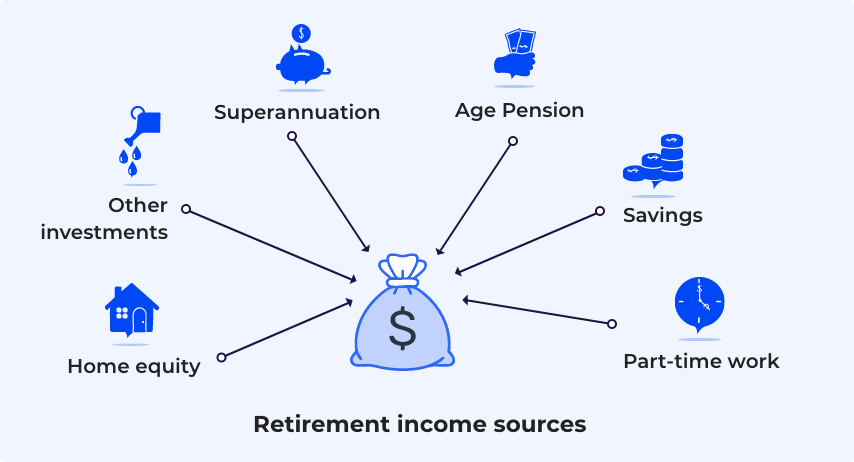Understanding how different income sources work together can help you make better decisions about your retirement.
The Age Pension, superannuation, work, personal savings and investments, and the equity in your home can all add to your regular income in retirement.
Each option is different – and not all may apply to you – but together they can provide the security you need.

Age Pension and government benefits
The Age Pension is the foundation of retirement income for more than half of Australians.
It provides a regular income and comes with a range of benefits including discounts on healthcare, transport and utilities.
Learn about eligibility for the Age Pension, benefits, and the application process.
Michelle gets help to understand her income options
Michelle has worked in minimum-wage jobs for most of her life and has a low super balance. She owns her home but has little saved. A few months before she turns 67, she contacts Services Australia’s Financial Information Service to understand her options. They explain what documents she needs and how to apply. Because she meets both the income and assets tests, Michelle is approved for the full Age Pension. With the Age Pension and discounts from her concession cards, Michelle can cover her costs and live independently.
Super income streams
For many Australians, super is the largest source of retirement income.
You have a choice how to use your super in retirement. It may be one, or a combination of, any of the following options:
- Account based pensions: a regular income funded by your super.
- Lump sum: you can choose to take some, or all, of your super at any time.
- Annuities: a guaranteed income for a set number of years, or for the rest of your life; can be bought with money from your super account, or from outside of super.
Account based pension
An account-based pension is a regular income stream funded by your super. Typically, you get to choose:
- how much you want to transfer from super into the account-based pension
- the size and frequency of payments (subject to meeting minimum drawdown requirements)
- how you want the funds in your pension account invested
Turning your super savings into a regular income stream gives you control over how and when you get paid. Read more about account-based pensions.
Taking a lump sum out of super
You might choose to take some, or all, of your superannuation savings as a lump sum. If so, it’s important to keep in mind that your savings might be needed to support your retirement for many years.
Also, once you take a lump sum out of your super, it is no longer considered super and you may not be able to put it back into the super system. If you invest the money, earnings on those investments are not taxed in the same way as they would be in the super environment. You may need to declare these earnings in your tax return.
Read more about taking super as a lump sum.
Annuities
Annuities provide a guaranteed income for a set number of years or for life. They can provide security and peace of mind even as other income sources change. But an annuity comes at the cost of being less flexible in how you can access your retirement income.
You can use super, savings, or a combination of both to buy an annuity from a life insurance company, super fund or financial institution.
Read more about annuities in retirement.
Barry invests in an annuity
Barry has been contributing extra to his super for years and has a healthy balance. But he wants a steady reliable income that doesn’t rely on investment markets. After speaking with his financial adviser, Barry uses part of his super to buy a lifetime annuity. This guarantees him a regular income for the rest of his life and provides peace of mind that his needs will be covered regardless of what happens to investment markets.
Lifetime income streams
A lifetime income stream is a financial product that pays you regular income for as long as you live.
You buy a lifetime income stream with a lump sum of money, such as your superannuation savings or your personal savings. The provider guarantees regular payments to you during your lifetime, which can give you peace of mind that you won’t outlive your savings.
This type of product might be known as a lifetime pension when you buy it from a superannuation fund and a lifetime annuity when you buy it from a life insurance company or friendly society.
Buying a lifetime income stream with your super might increase your Age Pension, as special rules apply under the Age Pension income and assets tests.
Learn more about lifetime income streams. And talk to your financial adviser to work out if a lifetime income stream is right for you.
Working in retirement
Many Australians choose to keep working for a period in retirement. Others may return to work after they have retired.
The choice is yours – and even part-time or casual work can help cover expenses and reduce the need to draw down on your super.
Explore options to transition to retirement.
Reverse mortgage and home equity release
If you own your own home, you may be able to use its value to help provide an income and cover larger expenses during retirement. Reverse mortgage and home equity release schemes allow you to unlock the value in your home without selling.
While these schemes can boost your income, they are not risk-free and it’s important to understand how they work and the long-term financial impact.
Find out more to decide if home equity release is right for you.
You could also consider downsizing your home to create more funds in retirement.